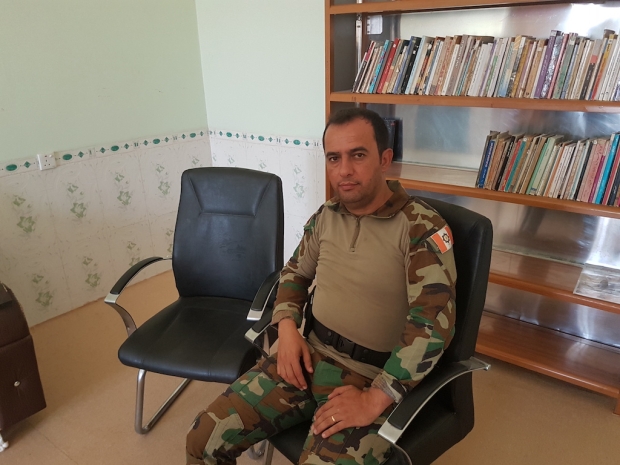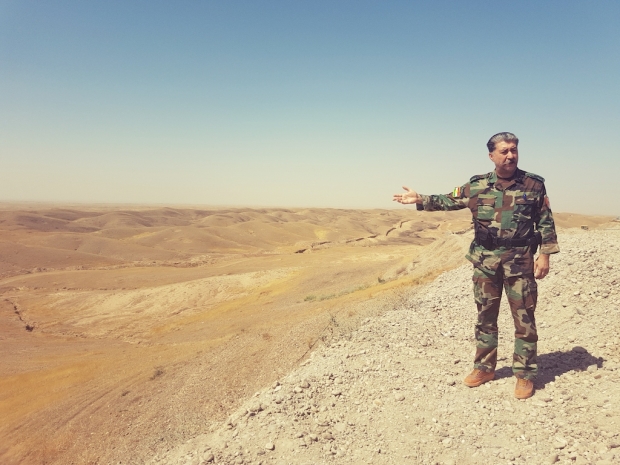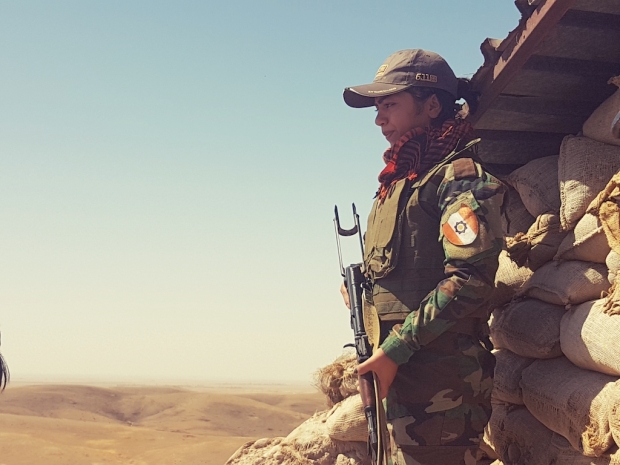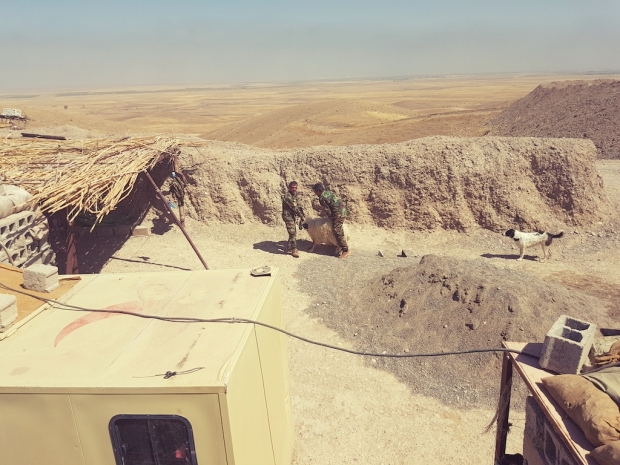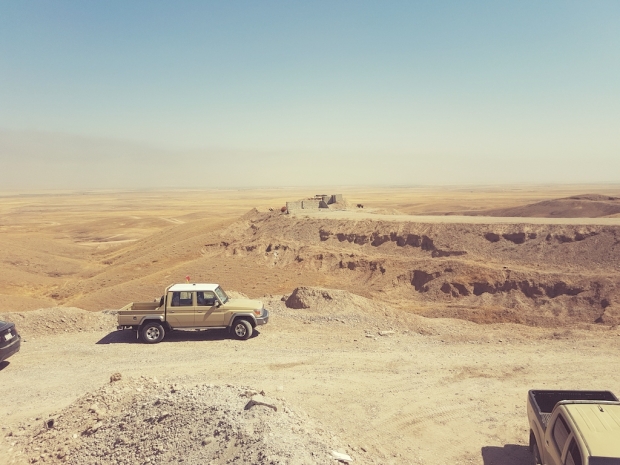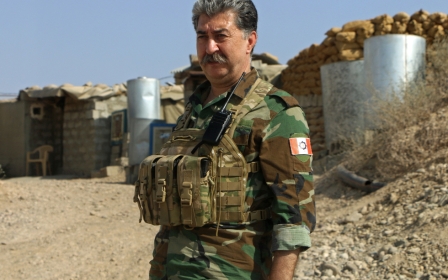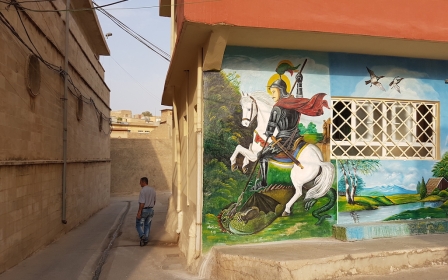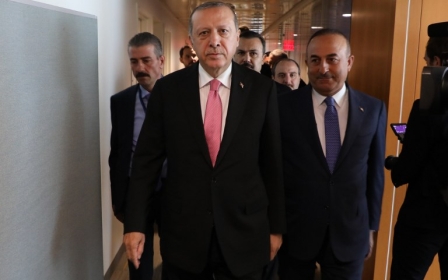Iranian Kurds prepare to defend Kirkuk after referendum
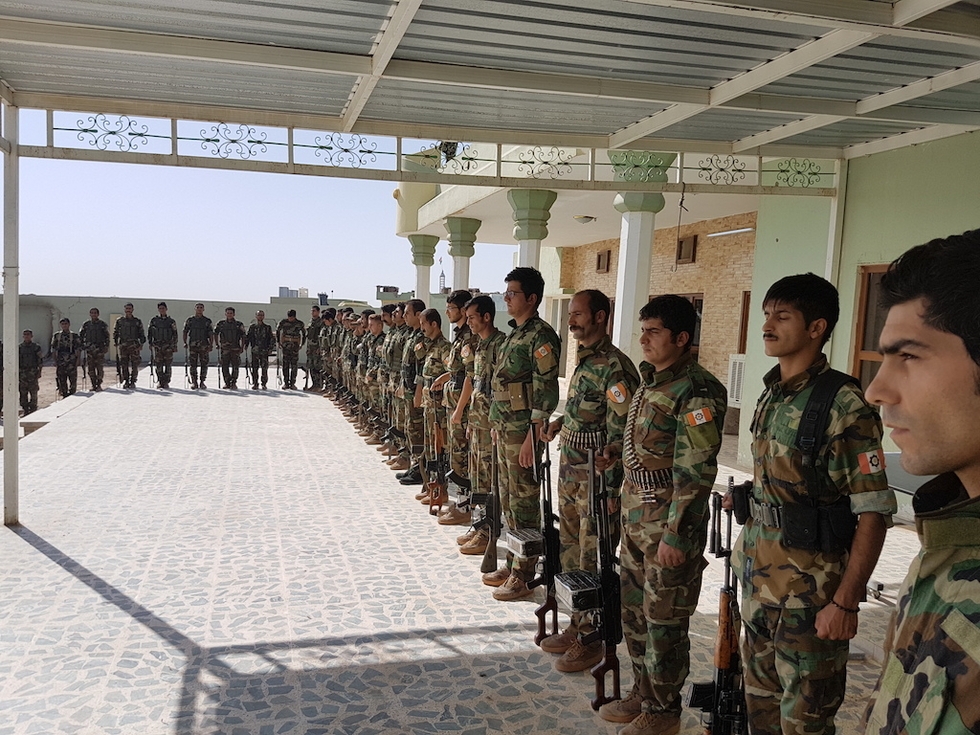
SAKHARA, Iraq - "What do we want?!" shouted the commander.
"Kurdistan state! Kurdistan state!" reply the Kurdish fighters, mostly young men in their 20s, assembled in the courtyard of their base in Sakhara, south of Kirkuk.
They are Peshmerga fighters from the Hoshabi al-Khalil unit of the Kurdistan Freedom Party (PAK), an Iranian Kurdish fighting group whose members have flowed in their thousands into Iraq with the aim, in their own words, to defend Iraq's Kurds from both the Islamic State group (IS) and the agents of the Islamic Republic of Iran.
They first arrived in 2014 to help Kurdish forces in fighting IS. Rising tensions around the upcoming 25 September independence referendum have now put the PAK on alert, and it has expanded its presence in and around Kirkuk, a Kurdish-controlled city which has been a major point of contention.
We Peshmerga are ready to sacrifice everything until the last blood to stop Kirkuk going under the hand of the Hashd al-Shaabi
- Erdelan Hosrevi, PAK commander
Kurds see Kirkuk, in northeast Iraq, as their cultural capital, while Baghdad has said the multi-ethnic city must remain part of Iraq. The inclusion of the city in the remit of the referendum has led to predictions of violence following the vote, something which the PAK says it has been preparing for.
"We've had this threat a lot - we see Hashd al-Shaabi, [the] Iraqi army, other militias - IS was just the shrubs of the big battle we expected, and this time it is about to come," said Erdelan Hosrevi, commander of the PAK camp at Sakhara.
Hashd al-Shaabi, an umbrella organisation of various militias with different backgrounds and loyalties, "will be worse than IS because they will be fighting and the Iraqi army will be supporting them. Of course, as Kurds, we will never be ending our battle and uprising against any who are stopping the Kurdish state, and we will never stop until we get our state, Kurdistan."
For the PAK, Iran is the primary enemy in the region, and it sees iran's hand behind a cross-border attempt to smash Kurdish national aspirations.
"We see Iran supporting the Hashd al-Shaabi and other militias in Iraq to stab against Kurds - we Peshmerga are ready to sacrifice everything until the last blood to stop Kirkuk going under the hand of the Hashd al-Shaabi," he said.
While Iraqi Kurds seek the creation of an independent Kurdish state in northern Iraq, the largely Turkey-based Kurdistan Workers' Party (PKK) advocates a federalised non-national solution to the Kurdish issue. The PAK, meanwhile, wants the creation of a greater Kurdistan stretching across the Kurdish communities in Iraq, Iran, Syria and Turkey.
Thousands of PAK fighters are currently in Iraq, largely around Kirkuk and in the surrounding hills, where they have also been pushing to liberate Hawija and the surrounding areas from IS.
Hussein Yazdanpana, the PAK’s leader, who famously bears a remarkable likeness to Josef Stalin, said from the frontline with Hawija a few miles from the Sakhara camp that his forces had a duty to intervene in Iraq.
"We are here to protect the rights of the Kurds and we are here to defend Kurds. The other reason is to protect the world," he told Middle East Eye.
"To protect the Kurds, and to protect the world, from terrorism."
Hawija and the surrounding areas mark one of the last strongholds of IS in Iraq, after they were driven out of their main base in Mosul in July.
As much as we see IS as a threat to the world, we see the Hashd al-Shaabi as more of a threat to the world
- Hussein Yazdanpana, PAK leader
But while Iraqi Arab forces and Peshmerga have taken part in operations to tackle IS in the past, the latest offensive in Hawija, launched on Thursday, has seen the Peshmerga left out in the cold, as tensions spiral between the government in Baghdad and the Kurdistan Regional Government over the independence referendum.
Jabar Yawar, secretary general of the Peshmerga ministry, announced on Thursday that they would not be taking part in the Hawija offensive and would only be strengthening their defensive lines.
This came as no surprise for Yazdanpana. He believed Kurdish forces were being hemmed in between IS and the Hashd al-Shaabi.
"They started to set up and create a militia there in Tawuq and in other villages and other areas five kilometres from here, to press forces behind us, and they brought the Hawija operation as an excuse to bring their forces here and to attack us," he said.
"So the [PAK] Peshmerga are stuck behind IS and the Shia militias - after that they will attack [to] retake Kirkuk from the Kurds. That is the plan.”
'Pawns of Iran'
The Hashd al-Shaabi, or Popular Mobilisation Units (PMUs), have repeatedly warned against the Kurdistan Regional Government attempting to annex contested areas of Iraq and have threatened to forcibly retake areas controlled by Kurdish forces, most notably Kirkuk.
While some Hashd al-Shaabi were formed following a call put out by Iraq's senior Shia cleric, Ali al-Sistani, in 2014 following the first IS assault, a number of Hashd al-Shaabi pledge loyalty to Iran's Supreme Leader Ali Khamenei.
In November 2015, Akram al-Kaabi, leader of the powerful Harakat al-Nujaba militia, said that he would overthrow the Iraqi government were he ordered to do so by Khamenei.
For the PAK, the Hashd al-Shaabi are pawns of Iran and their fight with them is simply another front for their on-going war with iran.
"We see the Hashd al-Shaabi as a threat to all Kurdistan, it is another different label of IS. We look at them as terrorists," said Yazdanpana. "As much as we see IS as a threat to the world, we see the Hashd al-Shaabi as more of a threat to the world."
"Tehran is the centre of terrorism and supporting terrorism in the world. If you defeated it and eliminated it, all countries would survive terrorism."
Iraqi Prime Minister Haider al-Abadi has also warned that if Iraqis were "threatened by the use of force outside the law, then we will intervene militarily".
Although the KRG has welcomed the presence of the PAK in Iraq, some officials expressed concerns about an unpredictable element in the country.
Speaking to MEE in 2016, Falah Mustafa Bakir, the foreign minister of the KRG in Iraq, praised the PAK.
I joined too with the boys, side by side to fight IS. If only I kill one, it matters
- PAK fighter
"The Iranian Kurdish peshmerga have been very loyal to us, faithful," he told Middle East Eye. "And a great fighting force."
"Would we have dialogue with them to prevent their cross-border activities?" he added. "Well, that's their decision."
The fighters involved in the PAK are all roughly in their early-to-mid 20s and left the repressive atmosphere of their homes in Iran to fight for Kurdish rights.
They are volunteers who do not recieve salaries; they say they are driven by their belief in their natural right to a state in the Middle East.
"I saw what the [Iranian] regime would do - they would not give us the right to get an education, not give us rights as Kurds; and I saw the different kinds of treatments they gave Kurds there," said Hajar Waleed Zade, a 27-year old volunteer from the city of Bukan in Iran's West Azerbaijan province.
"After we saw IS coming here, it was required of us to come to PAK and to come here and fight against IS, and it was the moment we could show that we can fight for Kurdistan."
Another volunteer, 28-year old Hajeer Behinae from Sina in Iran, said he had joined the PAK to liberate Kurdish land from the regimes "occupying" them.
Women take up arms
"After we suffered and saw this many times and couldn't do anything, I said 'this is an opportunity for me to participate with PAK and maybe I can make a difference and do something with my life,'" he said.
As in many Kurdish fighting groups, women fight alongside men in the PAK, many driven by the misogny they see inflicted by militant groups.
"After I saw what IS did to the Yazidi women, enslaving them and raping them, I couldn't watch it and see it without acting," said one 25-year old female fighter, referring to action against the Yazidi people in northern Iraq from 2014.
"I joined too with the boys, side by side to fight IS. If only I kill one, it matters.”
With only days left until the people of Iraqi Kurdistan vote to decide the future of their state, and with reports of Hashd al-Shaabi forces amassing in and around Kirkuk and other Kurdish areas, PAK are bracing themselves for war.
"Of course we are expecting an attack from them, because they are supported by Iran and Iran is trying to impose them to attack us," said one PAK member.
“When we are going back to Iran, we are fighting for our land to get it back," she said.
This article is available in French on Middle East Eye French edition.
New MEE newsletter: Jerusalem Dispatch
Sign up to get the latest insights and analysis on Israel-Palestine, alongside Turkey Unpacked and other MEE newsletters
Middle East Eye delivers independent and unrivalled coverage and analysis of the Middle East, North Africa and beyond. To learn more about republishing this content and the associated fees, please fill out this form. More about MEE can be found here.


